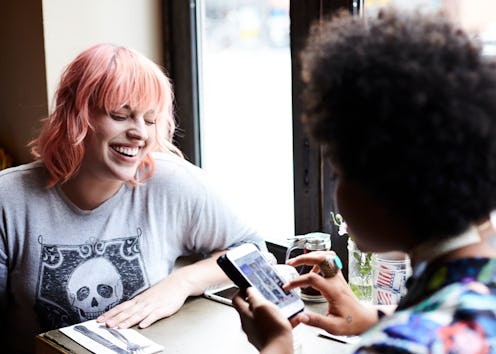Life
9 Things You May Do Because Of Anxiety — That You Should Never Have To Apologize For

If you experience certain symptoms or behaviors because of your anxiety, know that you're not alone. People with anxiety never have to apologize for living with what is actually a really common medical condition, just like diabetes or high blood pressure. In fact, anxiety affects around 40 million adults in the U.S., according to the Anxiety and Depression Association of America. And what's more, women experience anxiety more often than men, according to the National Institute of Mental Health. Sometimes, anxiety can show up when you're out living your daily life, but you never need to apologize for it.
Unfortunately, the negative stigma of mental illness is real, and it can lead to discrimination and even violence against people with mental illnesses, according to the Mayo Clinic. But the National Alliance on Mental Illness says the lack of exposure and education about mental illness is a major contributor to this stigma, so talking about anxiety and being open about how it affects us day to day is a major first step. And that includes not apologizing for how anxiety affects us. Anxiety doesn’t look the same in everyone, but these are just nine things people with anxiety never need to apologize for doing out in the open.
1Talk About Your Anxiety Without Fear Of Judgement
Anxiety is a medical condition, just like cancer or high blood pressure or diabetes. There's no need to talk about it in hushed tones like it's something to hide.
2Say Nothing At All
For some people with anxiety, certain situations can render them physically unable to speak, according to the Mayo Clinic. If that happens, it's nothing to be ashamed about, and nothing you need to apologize for.
3Have A Panic Or Anxiety Attack
Not everyone who lives with anxiety experiences panic or anxiety attacks, but those who do often live in fear of when the next will occur, creating a vicious cycle of anxiety. But if you do experience a panic attack in public, know that it isn't an "inconvenience" or "awkward" — what's most important is you feeling better.
4Get A Little (Or A Lot) Overwhelmed
Perhaps a less common symptom is that those who live with anxiety can feel easily overwhelmed by everyday activities. A few too many questions or emails at the same time can feel like an avalanche just came crashing on their shoulders. Know that your need to take a time-out is not a burden or an annoyance to others.
5Be Indecisive Or Overthink Things
Decision-making can be extremely challenging when you unintentionally overthink every situation. Sometimes, this causes the person experiencing anxiety to feel paralyzed by, say, the choice between what movie to see or whether to go out to dinner tonight. It's perfectly OK to pass the decision to someone else or give yourself more time to make a decision.
6Cancel Plans Or Decline Invitations
Sometimes a person experiencing anxiety just needs time alone, and that means declining a party invitation or cancelling plans you've already made together. There's no need to apologize for prioritizing self-care.
7Let Loved Ones Know If You're Exhausted
When you're constantly in fight-or-flight mode, it can be flat out exhausting. Activities that seem easy-breezy to people who aren't experiencing anxiety can be pretty taxing to people who are living with anxiety. Your loved ones actually appreciate knowing when you need to get some rest.
8Feel Proud For Getting Something Done
Knowing what challenges you face on a daily basis, it's totally cool to be proud of yourself for getting everyday tasks done. In fact, we recommend celebrating yourself whenever you can.
9Have Anxiety
One of the main things you should never, ever, ever feel ashamed about doing out in the open? Having anxiety. Full stop.
10
The National Alliance on Mental Illness says some of the best ways to fight the stigma against mental illness is to show compassion, educate others, and to talk openly about mental illness. Being open about having anxiety and supporting our loved ones who live with anxiety is the first step to ending that stigma.